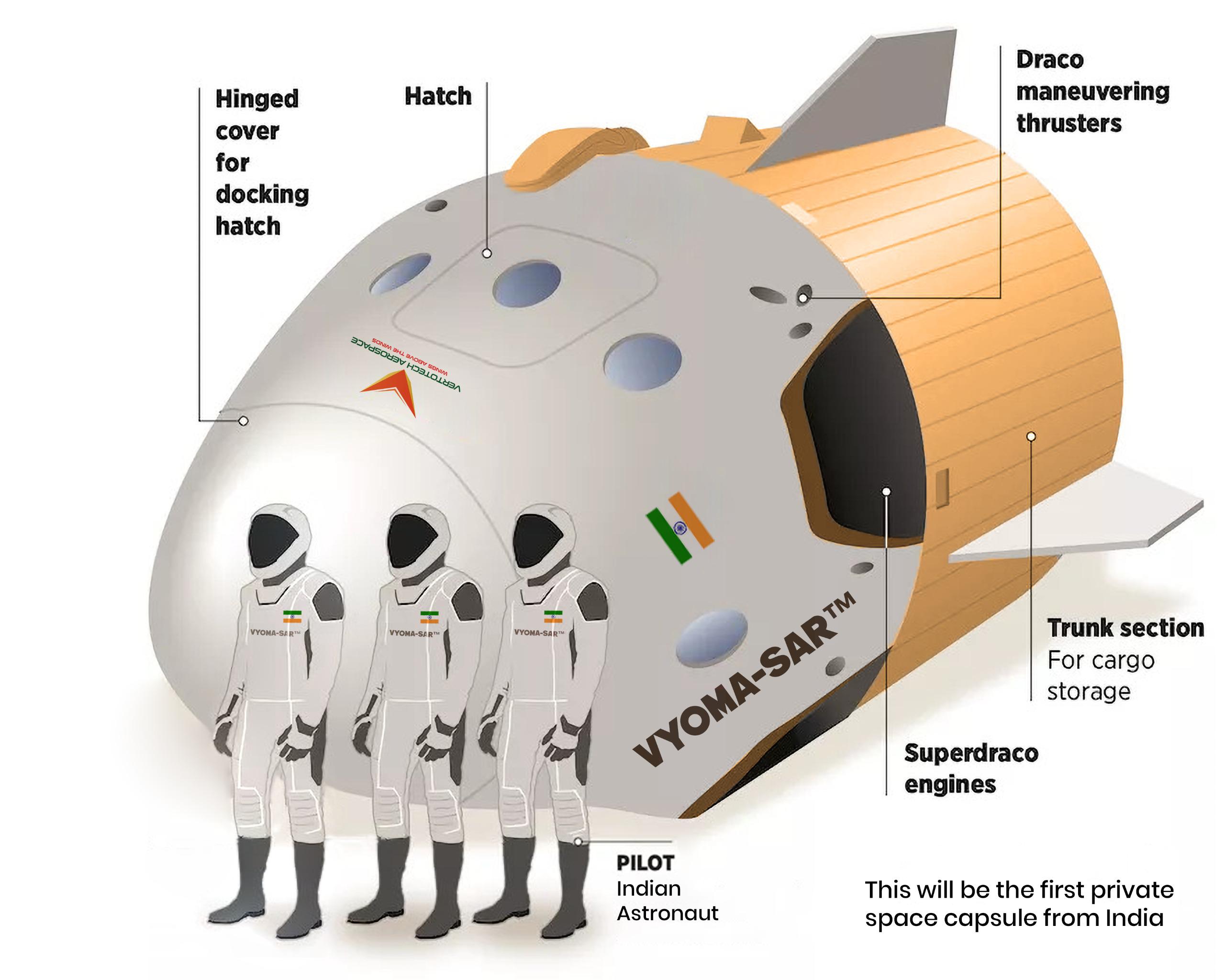As the global space economy accelerates toward an estimated $1 trillion valuation by 2040, India’s private aerospace sector is beginning to mark its presence on the international stage. Among the emerging players, Vertotech Aerospace Ltd has positioned itself as a company to watch, aiming to bridge national ambitions with global opportunities.
Founded with the mission of strengthening India’s self-reliance in advanced aerospace technologies, the company is developing a diverse portfolio ranging from human-rated space capsules to counter-drone systems. At its core lies an audacious goal: making India a credible force in the private human spaceflight sector.
Vyoma-SAR™: A Leap Toward Human Spaceflight
At the center of Vertotech’s innovation pipeline is Vyoma-SAR™, a human-rated crew capsule that draws inspiration from India’s Vedic heritage while integrating advanced engineering. Designed to work with ISRO’s PSLV and GSLV launch vehicles, the capsule has been conceived as a modular platform capable of carrying up to six astronauts.
The design incorporates features such as an emergency abort system, thermal protection for re-entry, and recovery modules for safe landings. Company engineers say its applications will range from low-Earth orbit missions to potential space station docking and lunar expeditions.
Industry observers note that Vyoma-SAR™ positions itself as an indigenous counterpart to the SpaceX Dragon capsule and NASA’s Orion spacecraft. However, its focus on cost-effectiveness and modularity could make it especially appealing to nations and agencies looking for affordable access to human spaceflight.
Building an Aerospace Ecosystem
Vertotech’s ambitions extend well beyond capsules. The company is developing an integrated ecosystem of solutions across aerospace and defence, including:
●Unmanned Aerial Systems (UAS) and counter-drone technologies for security applications.
●Ammunition and missile systems, aligning with India’s strategic defence requirements.
●Electric Vertical Take-Off and Landing (eVTOL) aircraft, targeted at future urban mobility needs.
●Launch support systems and next-generation spacecraft, intended to complement the capsule program.
Executives describe this multi-pronged approach as essential to addressing both national security priorities and the commercial opportunities of the expanding space sector.
VYAANA: A New Launch Vehicle on the Horizon
In parallel, Vertotech is working on VYAANA, a three-stage solid propellant launch vehicle designed for the small satellite market. At 29 meters in height and weighing 80 tonnes at liftoff, the rocket aims to deploy payloads of up to 500 kilograms into 500-kilometer orbits.
Constructed using carbon composite materials to reduce inert mass, VYAANA promises to deliver cost-effective and flexible launch options. The system will include bi-propellant thrusters for precision orbital injections and mobile launch capability, which could allow operators to adapt quickly to varying mission requirements.
The maiden flight of VYAANA is currently scheduled for 2028, a milestone that analysts say will be closely watched as small satellite demand continues to rise.
Leadership With Experience
Vertotech’s leadership team brings together expertise from both aerospace engineering and media strategy.
Mr. Jayakumar B, Managing Director, has over three decades of experience in India’s space program. A former project director of the PSLV and GSLV MkIII/LVM3 vehicles at ISRO, he also served as mission director for twelve PSLV flights. His background includes advisory roles with NewSpace India Ltd., giving him a direct view of how the private sector is reshaping India’s space economy.
Harishree Mehta, Group CEO and Director, comes from a contrasting but complementary background. A veteran broadcast journalist with two decades of experience, she has worked with CNBC, Times Now, and Doordarshan. Her engagement with business and political leaders is seen as an asset in shaping Vertotech’s narrative at both national and global levels.
Together, the duo reflects Vertotech’s strategy of combining technical expertise with broader outreach to stakeholders and markets.
National Ambition, Global Outlook
For India, the rise of companies like Vertotech represents more than commercial opportunity. It signals a shift in how space technology is perceived—no longer confined to government agencies but accessible to private innovators. Analysts say this could eventually parallel the United States, where companies such as SpaceX and Blue Origin now complement NASA’s programs.
Vertotech executives argue that the company’s dual vision sets it apart. Domestically, it contributes to sovereign capability by ensuring critical aerospace technologies are developed and retained within India. Internationally, it aims to become an exporter of advanced but affordable solutions, creating a potential niche in global markets.
Defence analysts suggest that if successful, Vertotech’s UAVs, missile systems, and capsules could accelerate India’s transition from a net importer to a net exporter of aerospace technology.
A Sector on the Move
India’s private space sector has grown rapidly in recent years, with policy reforms encouraging startups and established firms alike. While ISRO continues to maintain global prestige for its low-cost and reliable missions, the involvement of private companies is seen as vital to scaling the industry.
The government’s liberalization of space regulations, particularly through initiatives under NewSpace India Ltd., has opened the door for enterprises like Vertotech to develop independent capabilities.
Looking Ahead
With Vyoma-SAR™ in development and VYAANA scheduled for launch before the end of the decade, Vertotech Aerospace has set ambitious targets. Whether it succeeds will depend on execution, funding, and the ability to compete in a crowded global marketplace.
For now, the company represents a broader trend: India’s determination to play a leading role in the new era of space exploration and defence innovation. As private enterprises step up, the country’s ascent into space may no longer be a journey led solely by ISRO but a collective effort involving both state and private players.

